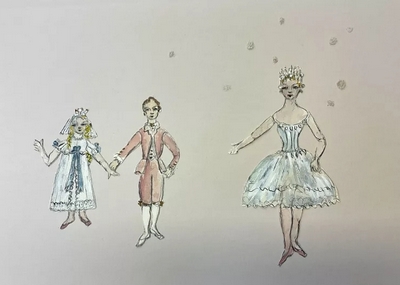New York City Ballet’s holiday institution is made even more magical by the whimsical costumes—which haven’t changed since 1964.
One of the beauties of tradition is consistency. The world keeps spinning, but certain beloved habits stay the same. During the holidays, such customs take on an even deeper meaning; it’s comforting to know that you can count on particular rituals to put you in the spirit no matter what. And the epitome of that, for many New Yorkers, tourists, families, and ballet enthusiasts is New York City Ballet’s production of George Balanchine’s The Nutcracker.
The seasonal favorite has largely remained unchanged since Balanchine added it to the repertoire in the middle of the last century. And that includes the showstopping, intricate wardrobes of the dancers, designed by Oscar-winning costumer Barbara Karinska in 1964.
“The legacy of Karinska is always just everywhere here in this shop and on that stage,” says Marc Happel, director of costumes for the company. “She was so integral to Balanchine’s work. He considered half the success of his ballets her costumes.” Karinska worked alongside Balanchine for much of both of their careers, including designing the costumes for other famous ballets, like Jewels.
The Nutcracker, first introduced in Russia in 1892, is a balletic telling of the story The Nutcracker and the Mouse King. The performance opens with a Christmas party at the Stahlbaum’s house, where young Marie is gifted a treasured nutcracker by magician Herr Drosselmeier. After the party, Marie drifts off to sleep, and awakens to a battle between the nutcracker and a battalion of mice. After taking down the rat king, the nutcracker transforms into a prince and whisks Marie off through the snow to a beautiful fantasyland: the Kingdom of the Sugarplum Fairy. There, the Sugarplum Fairy’s subjects entertain Marie and the prince with jubilant dances representing various sweets and treats, like marzipan and coffee.
The big, beautiful two-act ballet, performed 50 times each year, requires more than 200 costumes. Throughout the performance, whether children skipping at a Christmas party or a cup of hot chocolate come to life for a castanet-fueled flamenco, what the dancers are wearing was designed with movement top of mind. While there are many small flourishes imbued—ones that the audience might never notice, but that show the immense intentionality and attention to detail that went into each piece (take, for instance, the cameo containing a picture of Balanchine that sits at the center of the Hot Chocolate principal’s costume)—the designs even more so show how Karinska and Happel are focused on what the audience will see each time a ballerina pirouettes, leaps, or is lifted in the air. That, plus the ease of those steps for the dancers themselves.
“In many ways it’s like costuming athletes,” says Happel. “The movement is so extreme at times so it’s a lot about, thinking about, how do we approach this in a stretch way?” While the costume department doesn’t design brand new costumes each year, they do recreate certain aspects to be more modern or better accommodate the dancers. For example, the staff recently updated the tutu briefs to be made out of a stretch net that allows for more mobility. They have also developed a new dying workflow that ensures every dancer has tights that match their skin tone. “It’s kind of a science experiment of figuring the color that [the tights] are dyed and [the dancer’s] own flesh color and how they come together” under the lights on stage, explains Happel.
The team may also rebuild costumes in order to ensure they continue to look the same as they did in 1964. This may include replacing fabrics that fade or tarnish over time or reapplying embellishments (like the 65 crystal dewdrops on the Dew Drop costume or the 144 jingle bells on each Candy Cane outfit)—work the costume shop starts preparing for in September. “Color palettes have changed. A lot of the fabrics that were used back then, like antique satin, are no longer available,” says Happel, describing the unique challenges that maintaining the magic of The Nutcracker presents.
That magic, however, is what keeps audiences coming back year after year. And why the shop spends so much time and energy preserving and rebuilding designs that are six decades old. “The bottom line,” says Happel, “is that you want Nutcracker to look the same as when the little girl went decades ago and now has come back with her little girl.” Knowing that your mother or grandmother witnessed a Marzipan costume with tiny fabric carrots surrounding the tutu, just as you do today, creates a connection across generations as irreplaceable as the decades-old costumes themselves.
by Danielle McNally
Credits: instyle.com

